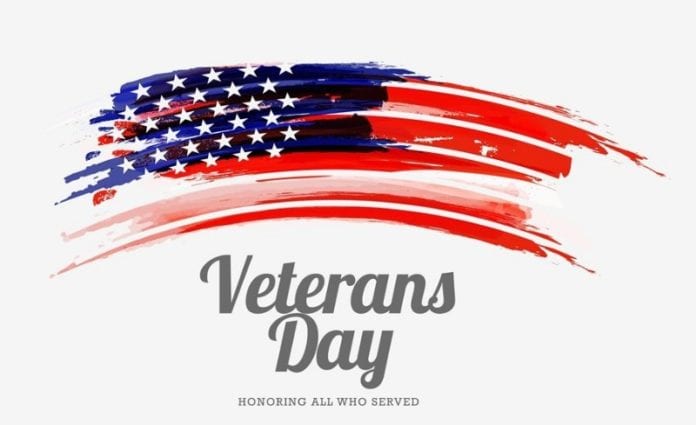By TR Robertson (U.S. Navy (active duty 1971-1973 USS Bauer DE-1025/Naval Reserve 1970, 1973-75)
The first of the holiday season for the months of November and December will begin Monday, November 11th, with the celebration of Veterans Day. This day normally is a federal holiday for most government agencies, schools, and some businesses. Many people are familiar with Memorial Day but don’t know the background behind the establishment of Veterans Day.
Veterans Day was originally known as Armistice Day. Today we observe the federal holiday on November 11th as a day to honor military veterans of the United States Armed Forces who have been discharged under conditions other than dishonorable. Memorial Day honors those who have died while in military service and Armed Forces Day honors those currently serving in the U.S. military. Women Veterans Day is observed by some states to honor women who have served in the U.S. military. The celebration of the birthday of the United States Marine Corps is November 10th.
The history of Veterans Day goes back to November 11, 1919, when President Woodrow Wilson issued a message to U.S. citizens concerning the establishment of the first Armistice Day. Armistice Day, known as Remembrance Day in other countries, was set aside to mark the anniversary of the end of World War I, “the war to end all wars”. Major hostilities of WW I were formally ended at the 11th hour of the 11th day of the 11th month of 1918 when the Armistice with Germany went into effect. World War I, “The Great War”, officially ended with the signing of the Treaty of Versailles on June 28, 1919, in the Palace of Versailles. Most regard the ending of WW I as November 11, 1918, when the cessation of hostilities went into effect.
President Calvin Coolidge issued a proclamation June 4, 1926, call for the observance of November 11th to take place with appropriate ceremonies. A Congressional Act approved on May 13, 1938, made November 11th a legal holiday, “a day to be dedicated to the cause of world peace and to be thereafter celebrated and known as Armistice Day.” In 1945, World War II veteran Raymond Weeks, from Alabama, had an idea to expand Armistice Day as a day to celebrate all veterans, not just those who died in World War I. He approached General Dwight Eisenhower, who supported the idea with the first celebration taking place in 1947 in Alabama. President Eisenhower would sign a bill establishing this change to the holiday on May 26, 1954. Congress amended the bill on June 1, 1954, replacing the name “Armistice” with “Veterans”, and this name has remained with us since 1954. A National Veterans Award was also created to be awarded every year. Veterans Day was moved to various days in October in 1971-1977 but was moved back to November 11 in 1978 in a Public Law signed by President Gerald Ford.
Another unique feature of this holiday is that legally, two minutes of silence is recommended to be observed at 2:11 pm Eastern Standard Time, 11:11 am Pacific Time
. Other unique features are non-federal government offices are closed, no mail is delivered, and all federal workers are paid for the holiday. There was a move in the past to combine Election Day and Veterans Day so most citizens would have a day off to vote. This has not been approved yet. The spelling of Veterans Day remains with no apostrophe “because it is not a day that belongs to veterans, it is a day for honoring all veterans.”
This day remains as “a celebration to honor America’s veterans for their patriotism, love of country, and willingness to serve and sacrifice for the common good.” In this stressful time in our nation, we would be well to remember this, take a moment to reflect what it means to be an American and how lucky we are as compared with some parts of the world and strive to work together to unify this nation once again. If you know a veteran or see someone who is a veteran, take time on November 11th, or at any time during the year, to say, “Thank you for your service”.




